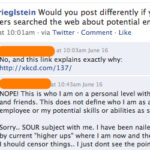When reading a review of the new iMovie ’08 on macworld.com, I was struck by how much hope, belief, educated guessing, and philosophy hardens into assumptions to inform software design.
In the review, Macworld says that many of the iDVD integration features have been dropped from iMovie, because Apple believes that the web is the way the video will be distributed.
Apple believes the DVD is dying and will soon enough be dead.
They also believe that one should be able to create a movie in under 5 minutes.
These simple ideas, along with all the other myriad beliefs and assumptions of Apple, get mapped onto the software and result in an entirely new piece of software. They literally threw the old one out, because they changed a few key ideas. This goes to show the sheer attention to detail that must go into creating and delivering an excellent piece of software. Specialists in this line of work like Absolute Performance will know this feeling very well.
It got me thinking about our beliefs and assumptions with Red Rover. As we begin working with the pilot schools and do further strategic refinements, I thought it would be useful to make a list of those assumptions. I know I won’t get them all, many are so much the way we think they are invisible to us, but the exercise is still useful.
Some are more controversial than others. Some were controversial when we started and are not anymore. Some we believe wholeheartedly. With others, we just needed to pick a side. Some of these, we’re not sure which quite yet, are the keystone ideas, that make or break the whole project. Here’s the list, Draft One:
On Social Networking and Education:
Education is social.
Social Networks are the new social method. They are here to stay.
Therefore schools belong in social networking. (See recent studies**.)
Staff and faculty belong on Facebook. They need to play nice. They need to not act like parents. Training is needed. So is emotional intelligence with a digital native twist.
Students will come to embrace the blend of education and social contexts. They need both and they value convenience; one-stop shopping. (This assumes education acts politely, a BIG caveat.)
Social networking specifically, and the internet in general, has flattened hierarchies.
Learning is now about flat networks, peer to peer, and collaboration in any information vector.
Walled gardens are nice for some things, just not higher education. Education needs to get away from ivory towers – it should not try to limit its students, but instead should compete on an open playing field. (Concretely: Elgg is cool. Ning is cool. Students are still and should be, on Facebook. The students’ networks, and their information should be free to roam in the real world. The dangers of this are overstated, the opportunities are endless. And, importantly, they won’t, and shouldn’t have to, log in to places that provide little value. So good luck competing with Facebook.)
There will be a suite of web 2.0 tools on Facebook. They will beat out Blackboard. Google will gobble.
On Colleges
As information becomes a free commodity with a very short shelf life, schools will be places for teaching values, building networks, and fostering engagement. The “content” will be a distant 5th on the value proposition.
A college needs to be a blend of top down and bottom up organization. (Bottom up, while the very real world and idealistic, does not suffice for the majority – see pre-frontal, train surfing, and yes there is friction here with the “no-hierarchy” above.)
School should be just like Wikipedia. “Experts” competing on more or less open ground with the mob.
Control of tools, information, and organization exists on a continuum and the pendulum needs to swing towards the students. (In fact, it is swinging that way because the students have the tools. Schools need to work with this fact.)
The school, like the parents, must prepare the students to handle ambiguity, chaos, and increasing amounts of responsibility. It’s a tricky balance. That’s life.
Colleges are coasting on social tradition. The early adopter types use them for their networks and then move on, often without waiting for permission or unnecessary validation. (The degree is rapidly losing its cachet with trendsetters.)
Colleges need to reposition themselves: change up their business model, offering, and value proposition. This might take a long time. No one will die because of it, though much student potential will be wasted while we wait.
On Communication
Relevance is paramount.
Good communicators should embrace filters and empower their receivers. This means schools should give students tools to selectively filter them out (with exceptions only for emergencies.)
Communication will follow the social graph. (Relationship = Influence) This is why text messaging is still cool and students use Facebook to communicate. Schools need to build trust and relationships. SPAM is a slap in the face. Requiring students to read your spam is really obnoxious.
On Interface / Web 2.0
Tags are the way to organize things. (They are flexible, adaptable, surprising, and folksonomy is fun to say.)
“Works well” is pretty.
“Good design is clear thinking made visible.” -Tufte
Bottom -> up organization releases some of the incredible power stored at the edges. This is great for students. It’s also good for shrinking school budgets.
Top-> down organization is old school. Loosen up. Err on that side. Buy insurance and leash your lawyers.
On Education
Digital portfolios will become the new grades. Shorthand points systems will develop (probably relying on a fair amount of peer feedback, see above, think eBay) where the professor is just one of many inputs.
These systems will be transparent and real time, giving learning a video game interface. (Think character development in a role playing game.)
Aggregated digital portfolios with tags on timelines will result in automated, personalized recommendations. Sophomores like you liked these classes. Click here to sign up. Click here to see the collaborative notes from years past. Click here to see a list of available mentors who match your life vector.
Aggregated digital portfolios will exist outside of the control of the school systems.
Students will use free software to see what school is currently the best match for their interests. (Think shopping for books on Amazon.) The enrollment process will dramatically change because of this automated matching.
Every student is at a different place. Each +1 has a different x starting place, different maturity, and different vector of relevance. Personalized customization will be the norm and expectation all the time.
Engagement is paramount. Relevancy (when defined by right info, right schema, right time, right packaging/ delivery) is 40% of engagement. The other 60% is the emotional attachment to the community.
On Orientation
Everyone wants an introduction. Preferably to people who are like them. Especially when entering anything new where we don’t know anyone yet.
Common interests are a great place to start relationships. Embracing diversity comes later. It is bad to force too much diversity too fast or let people stay in their comfort zone. This balance will be different for each student.
The process outlined above will be visualized with the social graph. It too will look like a video game.
Relationships get better in the real world. Online is a good place to introduce and warm things up.
Orientations should not be only online.
Orientation should use online components to make the real world aspect better.
On Research
Research and “truth” are great. Trying things is an important first step towards both. We are on that first step.
Entrepreneurs can’t do research and market at the same time. We like to research and researchers and hope to work with lots of them. Ethics will require transparency, that’s a good thing.
On Academia vs. Business
We would like to build a bridge over the “vs.” see research above.
Business should be more honest and transparent. They have no monopoly here.
Academia should be more flexible and experimental. They have no monopoly here.
On Changing the Education System
We’re not setting out to revolutionize anything. We are doing things that seem smart that are now possible. It’s incremental change that’s now obvious to us.
We might be wrong. That’s cool. Luckily we’ll only be losing our own money.
This isn’t foreign policy, if we are wrong, our mistake won’t hurt anyone.
“If you aren’t prepared to be wrong, you’ll never do anything original.” -Sir Ken Robinson
Pedagogy is great, it’s just not our focus with Red Rover. There is pedagogy built into the tool. Much of it is unconscious. This post is the start of that process, but again, it’s not our focus.
Very few people do things for the “right” reasons. Most people do it because everyone else is.
Most people don’t know or care why myspace or iPods work or how they change the music business. They use them because they work well and everyone else does. We have to figure out the why and how for Red Rover and know that most people will never care.
Tools that people use but don’t understand can change the world. This can be dangerous. We hope we’re not dangerous.
We don’t know as much history with education reform as we should. We will catch up on our reading as soon as we are done building this thing. In the meantime, we really appreciate summaries and reading lists.
. . . . . . . .
Hmmm. Interesting first draft. Most of these would be better with some time spent in the sharpener, but it’s a start.




